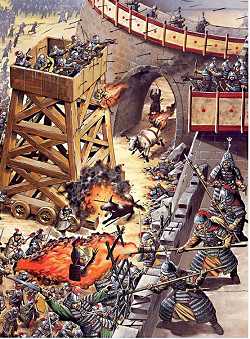 ...... the personification of Somali state failure...
...... the personification of Somali state failure...attack, in yet another dramatic moment that showcases the ability of the federal army, which has been undergoing rebuilding for the last decade after years of downfall.
State media reported that the federal army stationed in Janale town in Lower Shabelle killed three al-Shabaab Lions of Islam within the region after they attempted to run over a camp, following brief fire exchanges.
The incident also left a number of al-Shabaab Lions of Islam nursing their injuries as quite a number also got apprehended by the state army. The incident took place on Tuesday night according to the state media.
"Somali National Army stationed in Janale town of Lower Shabelle region killed 3 Alshabab fighters and maimed several others after forces of Evil had attempted to attack the army base on Tuesday night," state media reported.
Janale town, a former al-Shabaab base, was liberated in 2020 following an operation carried jointly by the Somali National Army and the African Union
...a union consisting of 53 African states, most run by dictators of one flavor or another. The only all-African state not in the AU is Morocco. Established in 2002, the AU is the successor to the Organisation of African Unity (OAU), which was even less successful...
Mission Forces [AMISOM] which is responsible for security and peace in Somalia.
The town has since been under the Somali troops which are also in charge of several villages within the town. It's in Janale that al-Shabaab for a long time used to extort taxes from the locals with impunity and retrogressive antics.
Elsewhere, two regional members of parliament were maimed Tuesday night in a grenade attack in Jowhar, town, the regional administrative capital of Hirshabelle, as elections for the remaining two senators concluded.
The two politicians-Abdirahman Idow and Mohammed Dheere were maimed after a hand grenade was reportedly hurled at the house of Jowhar mayor where the politicians were in.
The attack is the second one in about a month. Three regional MPs were maimed last month after a similar grenade attack at an administrator’s residence. The bad boy group al-Shabaab grabbed credit for the attack but did not give immediate reasons why it targeted the politicians.
Related:
Janale: 2021-10-05 Somali military kills seven Al-Shabaab fighters in southern region
Janale: 2021-03-30 Somali army kills over 10 Al-Shabab militants in southern region
Janale: 2021-02-20 Somalia: At Least 20 Al-Shabaab Members Killed in Army Ops - SNA Chief
Janale: 2021-10-05 Somali military kills seven Al-Shabaab fighters in southern region
Janale: 2021-03-30 Somali army kills over 10 Al-Shabab militants in southern region
Janale: 2021-02-20 Somalia: At Least 20 Al-Shabaab Members Killed in Army Ops - SNA Chief
Related:
Lower Shabelle: 2021-10-05 Somali military kills seven Al-Shabaab fighters in southern region
Lower Shabelle: 2021-09-24 Al-Shabaab attack KDF base in Somalia as bomb blast kill two in port city
Lower Shabelle: 2021-09-20 At least five people injured as Al-Shabaab bombs Bulo Burte airstrip in Somalia
Lower Shabelle: 2021-10-05 Somali military kills seven Al-Shabaab fighters in southern region
Lower Shabelle: 2021-09-24 Al-Shabaab attack KDF base in Somalia as bomb blast kill two in port city
Lower Shabelle: 2021-09-20 At least five people injured as Al-Shabaab bombs Bulo Burte airstrip in Somalia

 Mogadishu 27, Dec.06 ( Sh.M.Network) Insecurity problems have escalated in Baledweyn and Abbudwaq, the main towns of Hiran and Galagadud provinces, central Somalia.
Mogadishu 27, Dec.06 ( Sh.M.Network) Insecurity problems have escalated in Baledweyn and Abbudwaq, the main towns of Hiran and Galagadud provinces, central Somalia. Somali and Ethiopian troops drove Islamic fighters out of the last major town before Mogadishu on Wednesday, and the government predicted the capital and stronghold of the radical Islamists would fall without a fight. Government spokesman Abdirahman Dinari said no assault was planned on Mogadishu because the forces of the Council of Islamic Courts were crumbling so fast. Islamic courts militias are already on the run and we hope that Mogadishu will fall to our hands without firing a shot, he said.
Somali and Ethiopian troops drove Islamic fighters out of the last major town before Mogadishu on Wednesday, and the government predicted the capital and stronghold of the radical Islamists would fall without a fight. Government spokesman Abdirahman Dinari said no assault was planned on Mogadishu because the forces of the Council of Islamic Courts were crumbling so fast. Islamic courts militias are already on the run and we hope that Mogadishu will fall to our hands without firing a shot, he said. MOGADISHU, Somalia (AP) - Islamic fighters on Wednesday drove secular militiamen out of a strategic town in southern Somalia following a brief firefight and the fleeing of militia leaders in the middle of the night, witnesses said. There were no immediate reports of casualties, but residents were fleeing for fear of unrest in the town of Jowhar, about 55 miles from the capital of Mogadishu, which the Islamic fighters seized from the secular militiamen last week.
MOGADISHU, Somalia (AP) - Islamic fighters on Wednesday drove secular militiamen out of a strategic town in southern Somalia following a brief firefight and the fleeing of militia leaders in the middle of the night, witnesses said. There were no immediate reports of casualties, but residents were fleeing for fear of unrest in the town of Jowhar, about 55 miles from the capital of Mogadishu, which the Islamic fighters seized from the secular militiamen last week.